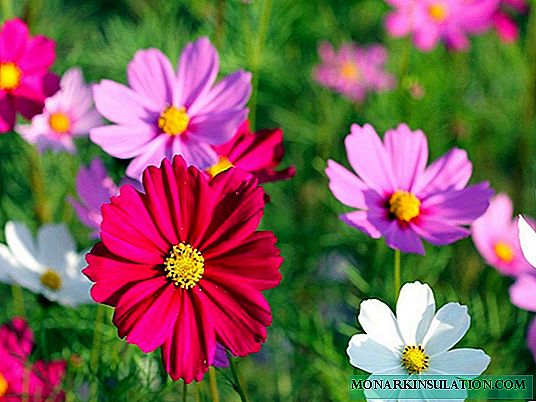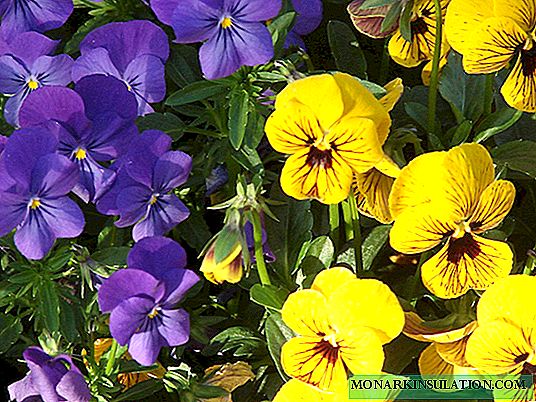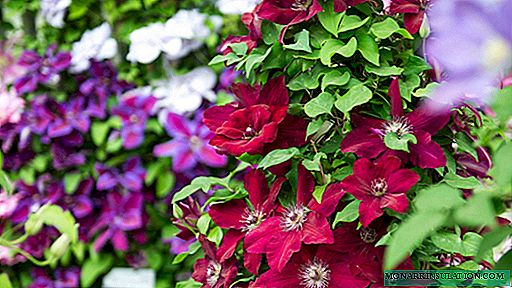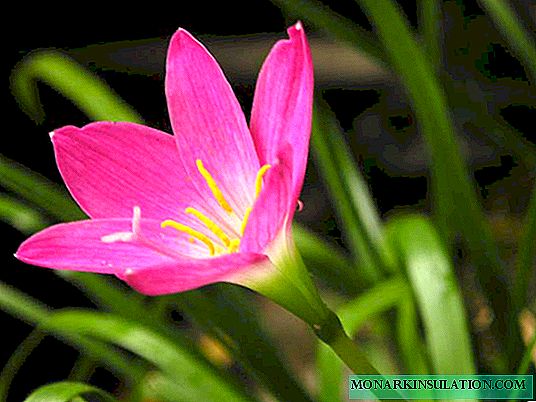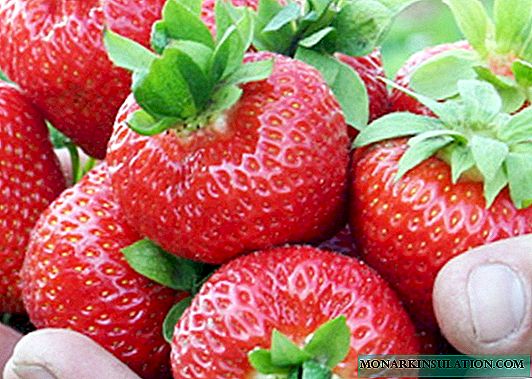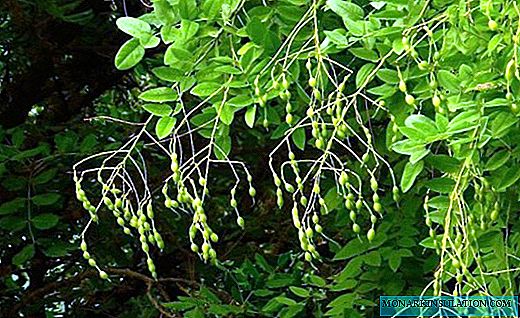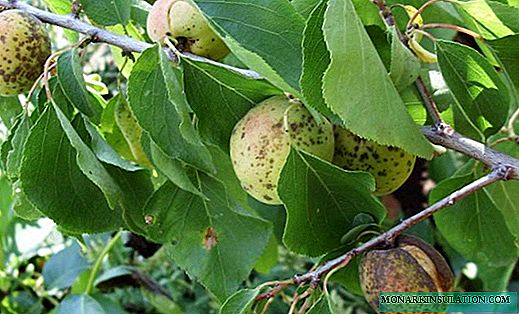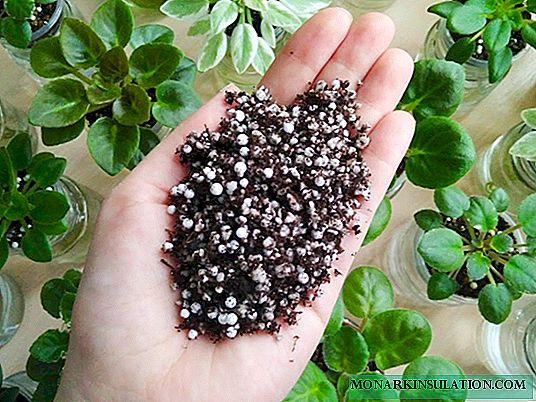One of the favorite flower growers of geranium varieties, Lake Pelargonium, is distinguished by a rich, rich orange color of large inflorescences. It will become a real decoration of any floral arrangement.
Grade description
Pelargonium Lake - a flowering plant. The bush is compact, with a small number of leaves, but with lush flowering. The color of the sheet plate is saturated green, with a black border, due to which decorativeness is increased. Inflorescences are large, salmon hue.

Elegant bright petals of an amazing plant will improve the mood with their decorative effect.
It can be grown in pots on the balcony, then the height of the bush will not exceed 60 cm, or in the open ground, in this case the plant will tend to rise a little stronger. However, in any case, it does not exceed 1.2 meters.
It is important to remember that pinching is necessary for the flower, otherwise pelargonium will grow upward, which will lose its decorative effect and become like a stick.
The variety belongs to the dwarf zonal, suitable for home flower gardens, greenhouses, winter gardens.
For reference! In Russia, this variety is not very common, so lovers of indoor plants often confuse its name. In reviews and forums there are such names: Luke, Pelargonium Like, Lake or even Lake.
Pelargonium Landing Lake
Lake - pelargonium is unpretentious, but it is important to choose optimal conditions for the plant.
Seat and pot selection
Like all home geraniums, Lake prefers light areas on the south side. However, it is very important to protect the green pet from direct UV rays by lightly shading the tulle. Draft is unacceptable, but culture loves fresh air, so you need to ensure constant ventilation.
The pot should be selected based on the size of the bush, given the fact that this geranium does not like "relocation." Models with a round shape up to 15 cm in diameter and height up to 20-30 cm look beautiful. But these sizes are relevant for an adult plant. For planting the handle, you can choose a regular plastic cup.
Note! The diameter of the container should not be too large, otherwise pelargonium will begin to develop the root system, from which the green mass and flowering will suffer.

A very beautiful plant will certainly respond to competent care and thank the grower with stunning caps of inflorescences
Priming
A drainage layer is mandatory, for example, of gravel, expanded clay, vermiculite. It will help prevent root rot. Soil can be bought ready for geranium. Or mix it yourself from turf, humus and coarse river sand.
Follow-up care
In order for Pelargonium Lake to please with elegant flowering, it is important to surround the flower with competent regular care.
Temperature mode
Pelargonium (pelargonium) came from the hot climate of the South American mainland. That is why they need a suitable temperature.
In summer it should be + 23 ... +28 degrees, in the period of rest (autumn, winter, early spring) - + 12 ... +15 degrees.
Attention! In winter, you can’t put a pot on the windowsill above the battery - dry air is harmful to the plant.
Watering and spraying, humidity level
The plant is water-loving, the soil is irrigated when the earthen coma dries up. Spraying is not required, but some growers use a spray gun as a way to destroy dust.
To maintain a comfortable level of humidity, you can put a container of water next to the flower.
Loosening
After each watering, carefully loosen the soil to ensure oxygen access to the roots. Do this carefully, since pelargonium has a superficial root system.
Feeding
Fertilize soil for pelargonium Lake should be in the period from March to September. At the same time, ready-made mineral complexes for flowering are used.
During the flowering period, they are fed with potash fertilizers, without using nitrogen-containing ones - they cause a rapid growth of foliage to the detriment of budding.

The plant needs quality care, only in this case it will not lose its decorative effect.
Pruning
Be sure to pinch the top, otherwise the bush will stretch upward, becoming like a "stick". Independently lateral shoots forms poorly.
Pruning is performed before the formation of a flower bud.
Breeding
When describing Lake Pelargonium, it should be noted that reproduction is possible in various ways. Seed is rarely selected because of the complexity, duration and lack of guarantee of preservation of varietal characters.
The most popular are the cuttings and rooting of the leaf, they will help preserve all the specifics and are quite simple to implement.
Dividing the bush - a method practiced by experienced gardeners, involves dividing the mother's overgrown plants into separate branches and transplanting each of them into a separate container.
How to transplant
The method of transplantation is transshipment with the preservation of an earthen coma. A layer of drainage is placed in the prepared pot, then the soil mixture. Then the plant is carefully removed from the old pot, moved to a new one and sprinkled with soil. Tamping is not necessary, the first watering is done no earlier than after 3-4 days.
Note! The best time for transplanting is spring.
Possible growing problems, pests
Proper care is the guarantee that there will not be any special difficulties. However, the grower needs to be prepared for anything. The main problems associated with pelargonium Lake:
- Yellowed leaves indicate that the plant needs to be fed.
- Reddish plates indicate that pelargonium is cold.
- Abuse of nitrogenous fertilizers can negate flowering.
- Dry buds are often associated with flooding.

The variety is loved by many novice growers due to its unpretentiousness and attractiveness.
The main pests: aphids, whiteflies. They are collected manually with subsequent destruction, or treated with fungicide.
Such is the stunningly beautiful elegant pelargonium of Lake - a plant ready to become a favorite of any grower due to its decorativeness and unpretentiousness.

